|
|||||||||||||||||||||||||||||||||
| Getting
Started |
Facts > Getting Started > Getting Started | ||
| |
Sources |
| |
Congratulations!—you've discovered POCM |
|
Ancient Pagan cultures shared a common set of ideas about Gods. Christianity adopted those ideas, and applied them to Jesus. Christianity
is a product of its time and place.
|
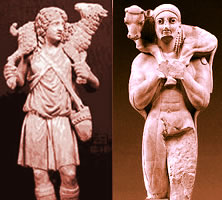 |
|
If you're like me, you grew up thinking it didn't. We were taught Christianity began with a big bang, with Jesus. Jesus changed the world with ideas about God that were new and revolutionary.
That's what POCM is about.
Jesus was the Son of God who suffered, died, and came back to life. But He wasn't the first Son of God who suffered, died, and came back to life. He brought salvation; but He wasn't the first God to do that either. His dad was a God and his mom was a mortal woman; He wasn't the first God there either. It's the same with miracles, disciples, ascending to heaven—the list goes on and on. Before the first Christians had these ideas about Jesus, Pagans had the same ideas about their Gods. That's what POCM is about. |
|
POCM in NOT about religious belief, at least not in the sense that I care whether you are Christian or not. I don't. POCM is not about changing your faith. I'm not pushing one religion over another; I'm not pushing a-religion or atheism over faith. I will say I'm not a Pagan. But if I did it right you'll go through everything here without otherwise figuring out what my religious convictions are. |
| POCM has three sections: Facts, Reasons, Guesses |
|
Since the idea of Christian-Pagan similarities is probably new to you, most of POCM is set up to help you discover the simple facts for yourself. Read the ancient sources and decide for yourself. |
|
|
You don't have to believe Greg. You'll discover the facts for yourself, in extended quotations of ancient writers. Look for the blue Ancient Quotation boxes. |
|
You'll discover: there is no consistent, reasoned analysis of the evidence that can pick out Christianity as fundamentally different from other ancient Pagan religions. Christianity is an ancient Pagan religion.
|
|
Why the blank
pages? To get a quick look at the basic ideas, you
can go to the big tabs at the top: |
|
Where to go for the quick scoop.
|
| Finally, if you've committed yourself to a literal bible, well, you're starting with an axiom that makes everything here impossible, so you won't miss much clicking away. No hard feelings. Enjoy, |
| What other people think about POCM |
| I
can't say that i'm Pagan, but i am looking into it. I'm trying to find
out as much as i can about it. You might be thinking that I didn't like your page simply because of your errors... well, it goes back further than that. You talk about Paganism like you know everything about it (i'm not saying you do know everything about it, but rather you sound like it). Now if you have errors in the language you're using to describe it in, how can i be sure that there are no errors in your teachings? (I know you say you're not trying to pursuade, but want it or not, those are considered teachings) On a more happier oppinion, this could just be the habit talkin. I'm not saying your writing is false, I don't even know that much about the religion. However, i would like you to think on it. Thanks. -Daniel 2 |
|
|
| A NEW FEATURE: A
scholarly and handsome reader Kicks POCM's Ass |
|
| < YOUR brainiac opinion here! > |
|
|
A scholarly and handsome reader Kicks POCM's Ass |
|||||||
|
Dear Mr. Kane, Thanks so much for your site POCM. More people should know about the origins of Christianity, especially people who seek to use non-original elements of it to further their own agendas. You've clearly put a lot of work into the site. I see that you've included a helpful list of books for the interested reader to learn more. Otherwise, however, I am not finding documentation of many of the specific facts the site provides, at the level of documentation expected of a college paper. (If it's there and I've missed it, my apologies.) I would like to recommend this site to students interested in these issues. I'm reluctant to do so, though. We teach our students to use sources that are either meticulously documented or are prepared by an authority in the field. If you teach religious history or related field at a university, or if there's a section of your site that documents all the various facts you site, then I would be thrilled to highly recommend your site, as well as use it myself. Otherwise, your site isn't much more credible than sites such as anti-climate science propaganda sites that sound plausible to those predisposed to those viewpoints. And that would be sad, because the information at those sites is obviously garbage while the information at your site appears to be very legitimate and of high quality. Thanks for considering my feedback, and thanks for the hard and careful work you've done preparing POCM. Sincerely, Associate Professor and Chair, |
|
||||||

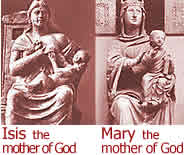
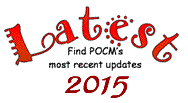
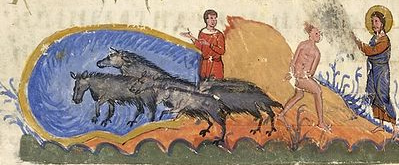 Notice
what POCM is not about. An example:
our gospels tell a story about the time Jesus
met a crazy man, who was inhabited by devils,
who spoke to Jesus, who cast those old devils
out, into a herd of pigs, who ran down a hill,
into the Sea of Galilee, and drowned. POCM
is not about the details of this story. It's
not about whether insanity can appear to be
cured because it's really just psychosomatic.
It's not about whether there were pigs in
Jewish Galilee, or whether there really is
a hill by the Sea of Galilee that pigs could
run down. POCM is not a naive hunt for
the historical "facts" of our Jesus
stories.
Notice
what POCM is not about. An example:
our gospels tell a story about the time Jesus
met a crazy man, who was inhabited by devils,
who spoke to Jesus, who cast those old devils
out, into a herd of pigs, who ran down a hill,
into the Sea of Galilee, and drowned. POCM
is not about the details of this story. It's
not about whether insanity can appear to be
cured because it's really just psychosomatic.
It's not about whether there were pigs in
Jewish Galilee, or whether there really is
a hill by the Sea of Galilee that pigs could
run down. POCM is not a naive hunt for
the historical "facts" of our Jesus
stories.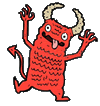 What
POCM is about is the ideas inside
the Jesus and Demons story. Hang on a second;
according to the bible, the first Christians
believed in demons. Demons. They believed
in demons. They actually believed there are
actual beings that live inside people and
cause illness. That think, and hear, and talk,
and move around, and do stuff. The first
Christians had the idea, the concept of demons.
The first Christians thought demons recognized
Jesus, and talked to Him, and He talked to
them, and overcame their supernatural power
with His own. How can that be? Where can these
ideas have come from? POCM is about where
Christianity got the ideas that shape our
first stories about Jesus.
What
POCM is about is the ideas inside
the Jesus and Demons story. Hang on a second;
according to the bible, the first Christians
believed in demons. Demons. They believed
in demons. They actually believed there are
actual beings that live inside people and
cause illness. That think, and hear, and talk,
and move around, and do stuff. The first
Christians had the idea, the concept of demons.
The first Christians thought demons recognized
Jesus, and talked to Him, and He talked to
them, and overcame their supernatural power
with His own. How can that be? Where can these
ideas have come from? POCM is about where
Christianity got the ideas that shape our
first stories about Jesus.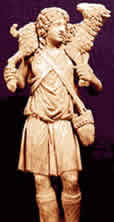
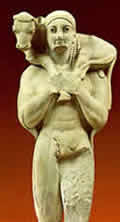
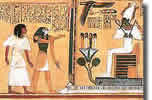







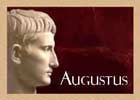


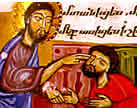


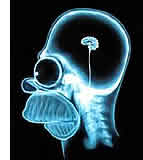 Your
page, though informatively seen from a different point of view (your
point), i didn't find that great. You have a couple of grammatical
errors and a couple of verbal misuse (I have a prefectionist habit
and if you would like some examples, i would be happy to show you, but
i won't include them in here).
Your
page, though informatively seen from a different point of view (your
point), i didn't find that great. You have a couple of grammatical
errors and a couple of verbal misuse (I have a prefectionist habit
and if you would like some examples, i would be happy to show you, but
i won't include them in here). 